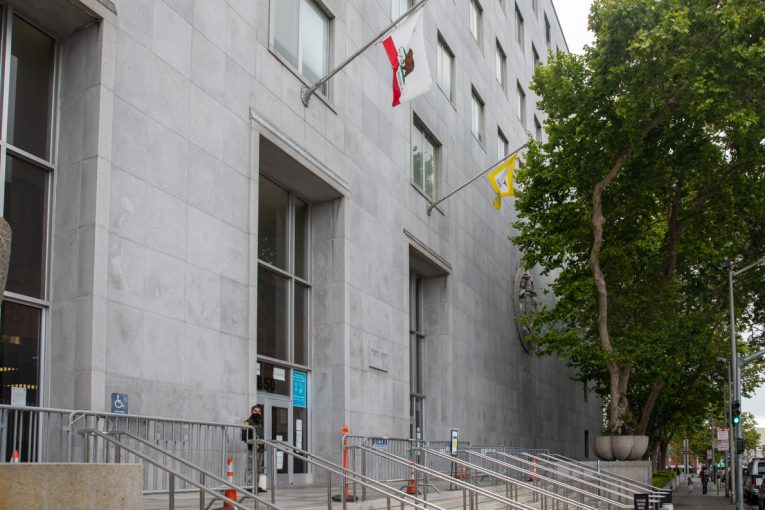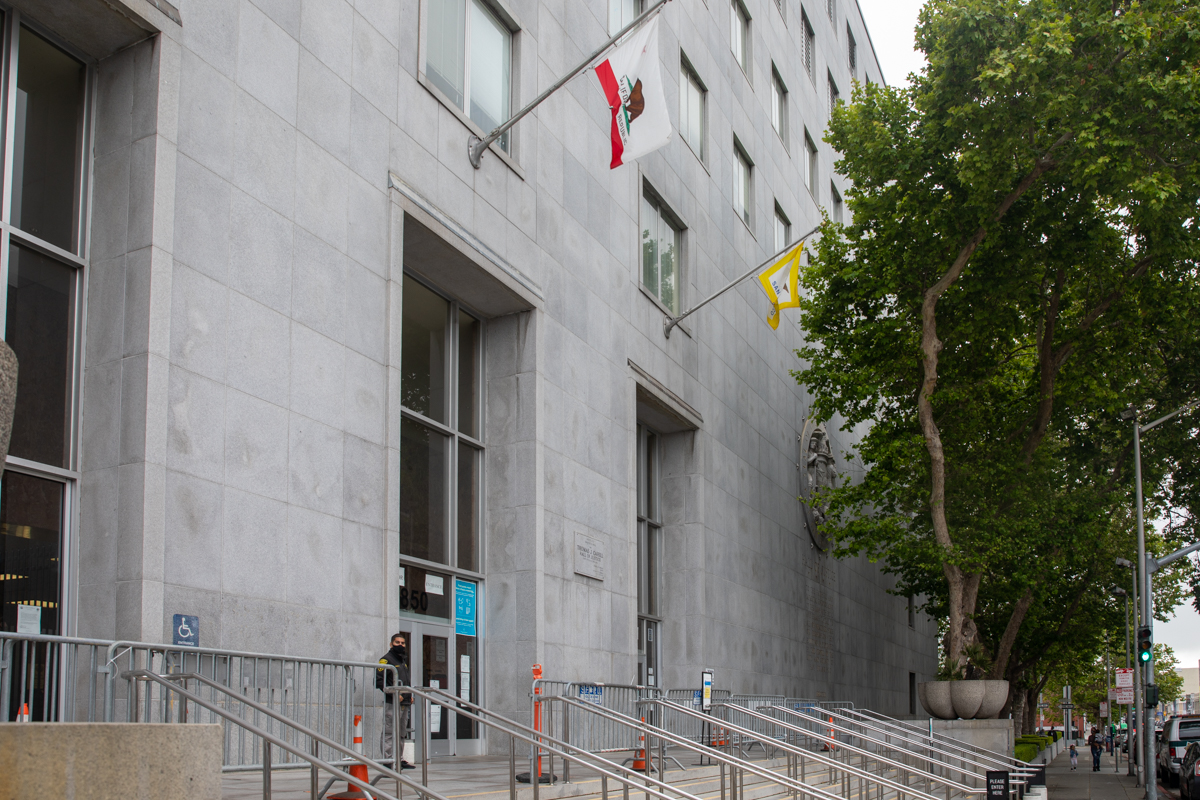

By Alana Bleimann, Mia Machado, Savannah Dewberry, Priana Aquino
SAN FRANCISCO, CA – Judge Sharon Reardon and a jury Monday heard the opening statements here in San Francisco County Superior Court in the case of defendant Omar Herrera, who allegedly committed a first-degree murder in San Francisco last year.
Deputy Public Defender Danielle Harris provided the court a play-by-play of the events leading up to the murder, and the unfortunate circumstances that led to Herrera’s involvement.
At the height of the pandemic, Herrera was 19 years old, and a good student who had little to no run-ins with the law, said the PD, adding that the defendant claimed an innocent outing to McDonald’s with a new friend turned into an intense evening resulting in one death.
PD Harris asked the jury to “not fix this tragedy by causing tragedy,” and in her opening statements, Harris detailed the environment in which Herrera grew up—one that contributed to why he carried a gun at the time of the incident.
Harris went through events with the jury prior to the March incident where her client felt unsafe. Two of these incidents involved being jumped by former bullies when walking alone.
She argued that these violent instances, in addition to the prevalence at which they occurred in the neighborhoods Herrera grew up in, led to his inquiry of where to purchase a firearm.
“It was a matter of time that one of these events that kept happening would end his life, so he got a gun,” she detailed after describing how it was very easy for him to get a gun in his neighborhood—a common reality for many Latino teenagers in the Mission District.
Harris noted Herrera never wavered in his responses to police questioning. He has consistently maintained that he had no idea why his friend Isaiah wanted to stop in the store, and that there was no premeditated plan to rob anyone or any place.
“[Herrera] did not want, try, or intend to steal,” Harris told the jury.
The day of the incident began with Herrera at home until the hours of the late afternoon, and, after walking around outside, he met Isaiah who invited Herrera to smoke weed with him and his friends that night, PD Harris said, adding that Herrera was picked up by Isaiah and two other individuals where “Omar sold a little bit of weed” to the other passengers before they returned home.
During the ride around 4:30 p.m., Herrera requested that they stop at a nearby corner store to pick up “candy and a drink.” And Harris told the jury, outside the store on Potrero, Isaiah approached a woman and stole her phone and proceeded to run back to the car.
Following his lead, “[the defendant] stopped for a second then started running, too.” Aat that moment, Herrera should have run home but he asked Isaiah, “Why did you do that? Don’t you ever do that again, with me around!” clearly upset about the event.
PD Harris explained that, at the time, Isaiah was 17 years old and used his recent birthday, just three days before, as an excuse to steal the phone from the woman outside the store. Isaiah sold the stolen phone to someone in Daly City and “he flaunts his $300 around from the sale” but Herrera did not get any of the money.
Attorney Harris maintained Herrera said he didn’t care about Isaiah’s motives, but continued to warn him to never do that around him again.
The two boys, and their friends in the car, headed toward Bayview Hunters Point to continue hanging out. After dark, as the two drove around, they decided to stop at McDonald’s on Potrero as their “last planned stop of the day.”
On the way to McDonald’s, Herrera dozed off.
When he woke up to the car being in park, he assumed they had arrived.
Not recognizing his surroundings, Herrera realized that Isaiah had taken him somewhere else. Meanwhile, Isaiah stepped out of the car and walked off to stand and wait on the corner, said PD Harris.
After sitting in the car for a long time, Herrera felt unsafe in the car alone, and decided to approach Isaiah to ask what was going on.
In response to this action, PD Harris claimed that “following someone into an unknown situation can be dangerous, but also not following your buddy is dangerous.” She added that Isaiah and Herrera were approached by the victim who seemed to personally know Isaiah, but Herrera could not confirm this.
Suddenly, a physical fight between Isaiah and the victim broke out after the two exchanged words that Herrera could not hear. Harris made it clear to the jury that Herrera “never touched him [the victim]” and also did not know what the fight was about nor how the two knew each other.
“Was [the victim] the one who Isaiah lost the money to?” Herrera would ask himself, said his attorney.
At one point in the fight, the victim fell to the ground, either from a blow by Isaiah or from losing his balance, and when he got back up he reached for his waistband.
Herrera believed that the victim was reaching for a gun so he pulled out his own gun, intending to flash it as a warning.
The Uber driver confirmed that Herrera never pointed the gun at the victim, only held it toward the ground.
Herrera shot a warning bullet and ran off back to the car with Isaiah, leaving the gun at the scene and the victim bleeding.
Herrera was found and arrested by 11:30 p.m., believing he was arrested for weapons possession, as he didn’t know that Isaiah also had been arrested and told the police the gun belonged to Herrera.
Harris described the condition of the bullet, according to facts presented by a ballistics expert.
“The mangled condition of the bullet” was caused by the bullet itself hitting something else before actually hitting the victim. Once it hit the victim, it hit his soft tissue below his elbow, flew into his torso, and came out the other side.
Because of that, the shot was classified as an accidental collision.
Herrera later told investigators that “he [the victim] tried to come at me and I got scared, bro…I just wanted to leave, I didn’t want no one to get hurt, bro…I know what I’m telling you is the truth.”
PD Harris went on to disclose several traumatic experiences Herrera experienced over the last four years leading up to the victim’s death that would explain why he behaved, and why he decided to buy a gun for protection.
Over the past four years, she said, Herrera experienced multiple separate violent instances in San Francisco. In 2016, he and his friend were followed by a van in North Beach. In 2017, after accidentally bumping into a man on the street, a gun was brandished at him and his friend. Later that year he was shot three times with a BB gun.
In 2018, he was beaten by people that he knew from high school after they drove by him on the street. In August of 2019 while waiting at a bus stop, the same man pointed a gun at him.
Herrera feared that one of these violence occurrences he kept suffering from would lead to his death. For protection purposes, he purchased the gun off the street. Harris revealed the ease at which he was able to secure a firearm, after only making slight inquiries about it around the neighborhood.
Harris emphasized the importance of the context that led to the victim’s death, and the intent of Herrera to defend himself.
PD Harris asserted that “two wrongs don’t make a right.” She explained that the victim died, but that his death would not be remedied by “committing another tragedy.”
The trial reconvenes Tuesday.
 Alana Bleimann is a junior at the University of San Francisco majoring in Sociology with a minor in Criminal Justice Studies. She is from Raleigh, North Carolina. She is the team leader on the Chesa Boudin Recall – Changing the Narrative Project.
Alana Bleimann is a junior at the University of San Francisco majoring in Sociology with a minor in Criminal Justice Studies. She is from Raleigh, North Carolina. She is the team leader on the Chesa Boudin Recall – Changing the Narrative Project.
Mia Machado is a junior at UC Davis, currently majoring in Political  Science-Public Service and minoring in Luso-Brazilian studies. She is originally from Berkeley, California.
Science-Public Service and minoring in Luso-Brazilian studies. She is originally from Berkeley, California.
 Savannah Dewberry is a student at the University of San Francisco. She is pursuing a Media Studies major with a minor in Journalism. Savannah Dewberry is an East Bay native and currently lives in San Francisco.
Savannah Dewberry is a student at the University of San Francisco. She is pursuing a Media Studies major with a minor in Journalism. Savannah Dewberry is an East Bay native and currently lives in San Francisco.
 Priana Aquino is an incoming 4th year at the University of San Francisco, majoring in Business and minoring in Legal Studies. Upon graduation, she hopes to attend law school and continue her work in uplifting and advocating for communities of color.
Priana Aquino is an incoming 4th year at the University of San Francisco, majoring in Business and minoring in Legal Studies. Upon graduation, she hopes to attend law school and continue her work in uplifting and advocating for communities of color.
To sign up for our new newsletter – Everyday Injustice – https://tinyurl.com/yyultcf9
Support our work – to become a sustaining at $5 – $10- $25 per month hit the link: